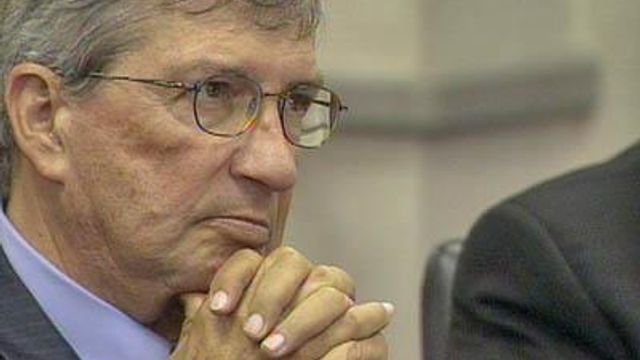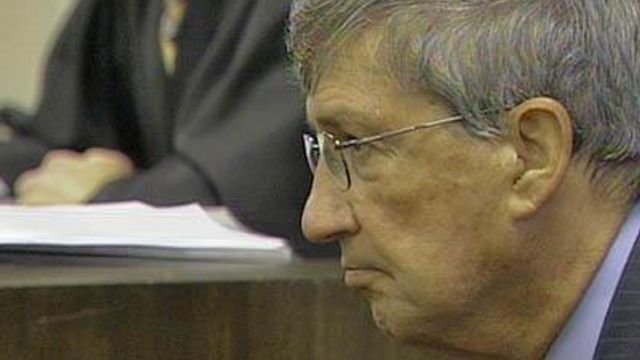Black Gets Prison, $1 Million Fine on Obstruction Charge
Former House Speaker Jim Black was sentenced to eight to 10 months on an obstruction of justice charge and was fined $1 million. Sentencing on a bribery charge will take place in December.
Posted — UpdatedSuperior Court Judge Donald Stephens withheld sentencing Black on a bribery charge until December, allowing Black that time to pay off the fine.
If he meets that deadline, Stephens said he would sentence Black to between 19 and 23 months in prison for bribery and would run both sentences at the same time as Black's current federal prison sentence. If he doesn't, he could face more prison time.
Black spent his first night behind bars in the county jail Monday night after surrendering to U.S. marshals to begin a 63-month federal prison sentence for public corruption.
"It's all about money and the lust for power," Wake County District Attorney Colon Willoughby said during the sentencing hearing. "That's what this case is about -- trying to get power and hold onto power."
Black, a 72-year-old Mecklenburg County Democrat, held the top position in the state House for a record eight years before resigning in February and pleading guilty to both state and federal charges.
"Everybody in North Carolina pretty much knows my life has been ruined unless I can take the rest of my life and turn it around and make it something useful," he said Tuesday during the hearing. "This whole thing bothers me. ... I've embarrassed my family (and) the state."
Stephens said listening to Black's financial misdeeds troubled him as much as listening to a gang-related slaying case on Monday.
"We got to look into the window of politics, and the view from this window is rather unsavory," he said. "For some people, the chase for power becomes an intoxicating obsession, and they seem to be willing to do anything to get it or to hold onto it."
Stephens said he considered whether to force Black to serve the state sentence after he completed his time at a minimum-security federal prison camp in Lewisburg, Pa. He said the state is the victim of Black's crimes.
"I do believe that the way you punish a person who has abused political influence and has abused money and has abused power is by taking away that influence and that power and also by taking away the money," he said. "I think the federal government has taken care of taking away the power and taking away the influence. It's the purpose of my sentence to take away the money."
But defense attorney Ken Bell said Black's wife, Betty Black, who is in poor health, likely will bear the brunt of the fine.
The bribery charge stems from Black's actions in early 2003 after the Republicans had won a narrow majority in the House.
Former Forsyth County Rep. Michael Decker said Black gave him $50,000 to switch to the Democratic Party and back his candidacy for speaker, allowing Black to forge a power-sharing agreement with former GOP Rep. Richard Morgan.
Black has repeatedly denied bribing Decker, but he said Tuesday that he gave Decker at least $10,000 around the time Decker switched parties. He said the money was a gift "to help him with his living conditions," noting Decker lived out of a broken-down van while in Raleigh.
Authorities have said much of the money given to Decker came from campaign donations from optometrists across North Carolina in which the payee line on the checks had been left blank.
Speaking so softly that he had to be asked several times to repeat himself, Black said he couldn't remember where the money came from, noting he and his wife always had cash and that he was "generous with my money."
He testified that Decker first approached him about selling his vote in 1997. He said he rebuffed the effort but never reported it because he didn't think the GOP power structure would pursue the case.
They met again after the 2002 election when Decker couldn't gain a leadership position in the Republican caucus. Black said he gave Decker cash after gaining his support and that of other lawmakers in his bid for re-election to the speaker's position.
"They were on my team," Black said, adding that he wouldn't have given them money if they didn't support his candidacy.
The obstruction of justice charge stemmed from allegations that Black encouraged chiropractors to fudge when speaking to authorities about cash they had given to Black. The cash payments, which topped $25,000, were the basis of the federal corruption charge.
"I'm not denying I took cash from chiropractors that I was not supposed to take," he said, calling it "one of the worst mistakes I've ever made."
Still, Black said the chiropractors' money wasn't in exchange for backing legislation favorable to the industry.
"There was never, ever, ever a quid pro quo," he said. "I have always separated that."
Willoughby also questioned Black about a $500,000 gift from lobbyist Don Beason in 2000. The testimony was the first time Beason was identified as the lobbyist involved with the money, which was made public shortly before Black was sentenced in federal court.
Beason is regularly ranked among the state's most powerful lobbyists, and he represents clients from BB&T to BellSouth to the North Carolina Restaurant Association. In 2000, he also represented video poker industry.
Black said the money from Beason was a bridge loan to help him redevelop a building in Charlotte that was mistakenly deposited in his campaign account. But he said it was quickly repaid after the real estate deal fell apart.
"I borrowed the money for a business transaction," Black said. "It was quicker and easier (to take Beason's money). The bank puts you through a lot of hoopla, and Don Beason doesn't."
Black said he never reported the transaction in his campaign-finance reports because "it was a wash," and he said he didn't consider it unethical.
Virginia Kelly, Black's former campaign treasurer, testified that Black put $500,000 from his personal or business account into the campaign fund shortly after Black repaid Beason.
Beason has testified before a federal grand jury about the transactions with Black, and his statements jibed with Black's version of the events, defense attorney Bell said.
• Credits
Copyright 2024 by Capitol Broadcasting Company. All rights reserved. This material may not be published, broadcast, rewritten or redistributed.






